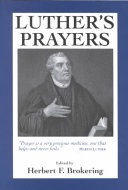










There is no monotony in the prayer salutations of Luther. Some are lengthy. He is as one in continual conversation with God. To him the name of God is the presence of God. Many of the prayers end as abruptly as they begin. Some close with several "Amens," like a hallelujah chorus. It is clear that his faith and confession became devotion and prayer. The chief parts of the Small Catechism, so well known as statements of faith, as seen here, are natural avenues of prayer for Luther. His interpretation was rooted and strengthened and nourished in prayer. Doctrine was his way of life. It was the topic for each of his prayers. A credal statement was always in need of meditation and devotion. It was no end in itself. The prayers are on topics spanning all of life. The soldier, employer, politician, pastor, sick person, parent, newlywed, teacher. One might wish to retain in these translations the rhythm and meter and mental images of this 16th century Saxon preacher and poet. It may be that the prayers find some of their poetry in this day as they are prayed aloud.

